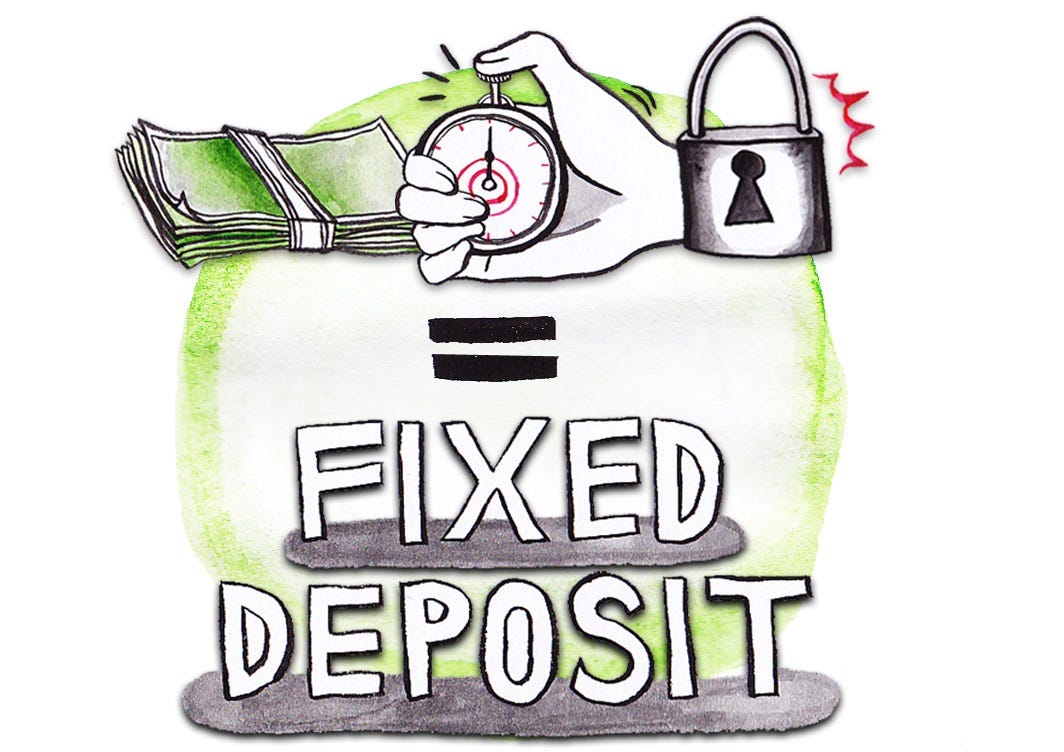 |
Fixed deposits are a credible way to make a return on investment that is somewhat higher than a standard savings account.
A fixed deposit is meant for those investors who want to deposit a lump sum of money for a fixed period; say for a minimum period of 15 days to five years and above, thereby earning a higher rate of interest in return. Investor gets a lump sum (principal + interest) at the maturity of the deposit.
Various options available are as follows:
- Bank Fixed Deposits
- Interest Rate: Based on tenure.
- Liquidity: High. Allows premature withdrawal.
- Credibility: High. Bank Deposits are secured by RBI up to 1 lacks rupees per branch, which means that if bank does not return you the money or goes bankrupt, RBI will pay you up to 1 lacks of deposits.
- Tax: Interest earned is taxable, after Rs. 10,000 of interest accrued per annum. Tax is deducted at source.
- Post Office Time Deposits
- Interest Rate: Based on tenure.
- Liquidity: Partial. Allows premature withdrawal after one year.
- Credibility: High.
- Tax: The 5 year investment qualifies for Section 80C. Interest earned is taxable, but not deducted at the source.
- Fixed Deposits offered by Companies / Financial institutions / Non-Banking Finance Companies
Various companies offer fixed deposit schemes having lucrative interest rates. A list can be found here
https://www.bajajcapital.com/fixed-deposits/company-fixed-deposits.aspx- Interest Rate: Varies. Can be higher than bank and post office deposits.
- Liquidity: Depends upon company. Some are not liquid at all.
- Credibility: Risks involved based on company. Look for a minimum “A” rating by a credit rating agency. Read the following link for more information: http://www.jagoinvestor.com/2010/04/are-company-fixed-deposit-safe.html
- Tax: Interest earned is taxable. TDS may be deducted after a limit.
Some Terms:
Asset: Any item of economic value owned by an individual, especially that which could be converted to cash. Examples are cash, securities, gold, office equipment, real estate, a car, and other property.
Liquidity: It is the ability of an asset to be converted into cash quickly. A person needs to have some amount of liquid asset which can provide him quick cash in case of urgency.
Non-Cumulative Income: It provides you with regular periodic interest income either on a quarterly or half-yearly basis.
Cumulative Income: It provides you with a lump sum at the end of the deposit tenure. The interest gained is carried forward to the following period.
Tax Deducted at Source (TDS): It is one of the modes of collecting Income-tax. It is the tax that one has to pay at the time of earning an income. The tax is deducted from the income and the balance is paid to the person.
References
- Post office Time Deposit
https://www.indiapost.gov.in/Financial/pages/content/post-office-saving-schemes.aspx - CRISIL:https://www.crisil.com/
- CARE (Credit Analysis & Research Ltd)
http://www.careratings.com/ - BWR (Brickwork Ratings)
https://www.brickworkratings.com/
No comments:
Post a Comment